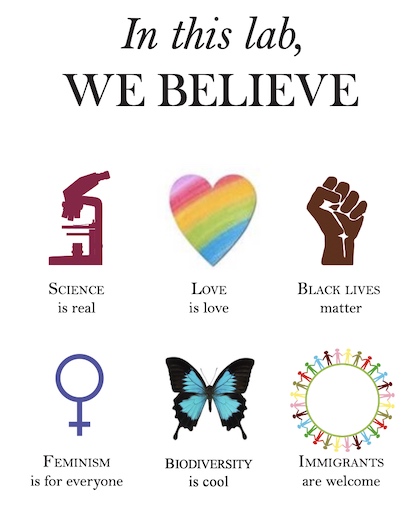Values
Science and academia are inherently competitive. Some people thrive in this environment, but for others it can have negative effects on health and wellbeing, particularly at early or mid-career stages. In the context of work pressures and power imbalances, intra-group and mentoring relationships can be soured by other problems including fraud, bullying, sexual harassment, and various types of anti-social behaviour. It doesn’t have to be this way. I am committed to creating a collaborative and people-centred research environment, along the lines described by Fernando Maestre (2019). In the following sections, I have summarised the lab culture and codes of conduct we aspire to, drawing some inspiration from others (including Timothée Poisot, Meghan Duffy, et al.).

Promoting equality, diversity & inclusion (EDI)
Everyone is welcome regardless of their neurological idiosyncrasy, gender identity and expression, sexual orientation, disability, physical appearance, race, age, politics and religion. I believe that as a research community we are often strengthened by diverse styles and outlooks. These issues are so complex today, in a world where positive attitudes to diversity are increasingly attacked and misrepresented as “cultural Marxism” or some form of “cancel culture” whereby political correctness is threatening Western civilisation. While it’s true that any ideology can be taken too far, I think kindness and equality are worth fighting for. I am committed to being an ally whoever you are, whatever your gender, skin colour or background. For the sake of clarity, the accompanying image (adapted from www.sammykatta.com) expresses my personal values and a pledge to action.
Recognising success & acknowledging failure
Rejection is the Rule in academia. Given that papers, grants and other applications most often fail, particularly early in a research career, it’s easy to be discouraged by the general over-reporting of successes on social media and websites like this one (the problem and its effects are discussed here). In terms of building a supportive community, I believe in celebrating each other’s successes while also communicating failures as this helps to normalise the many disappointments along the way.
Work schedules & out-of-hours policy
A crucial antidote to the pressures of academia is flexible working hours. If you join the lab, you are free to deviate from a traditional 9 to 5 day, according to your needs. Similarly, we are each welcome to send work-related emails late at night or over the weekend, but no lab members are required to reply to them outside their chosen work hours.
Be kind to yourself
Beware of burnout and other challenges that can creep up on you at any career stage but perhaps especially during PhDs and post-docs. Feel free to get immersed in your work, but please do not exhaust yourself. Be mindful of your limits. Aim for improvement, not perfection. Be content with small steps; get used to the sense of slow progress or no progress at all; and try not to be afraid of asking questions or seeking support. See this article for some useful perspectives.
Keeping all this in mind, I believe we can co-create a healthier working environment with mutual kindness, patience, communication, a little humour and clear expectations.

Expectations
An understanding of mutual expectations is key to the success of mentoring relationships. Here are some of the things I expect of graduate students working in my group and also things that they can expect from me.
I expect from you
- Courtesy and respect to others at all times. Intolerance is not welcome here. We create our culture, and our culture is inclusive.
- Communication and honesty. Just tell me when you hit roadblocks, personal or professional, and I will try to solve them with you. Also remember, we all make mistakes at some point, as I will demonstrate for you with surprising regularity. If it’s your turn to make a mistake, do your best to acknowledge it and to correct it if possible. After all, everyone’s work forms a foundation for others and a small issue ignored can become a much larger issue down the road.
- Independence and resourcefulness. That doesn’t mean you need to feel awkward when you get stuck or need help.
- Collaborative spirit. Running a research group is a collective effort, and we all contribute to our collective success.
- Co-supervision of undergrad or masters projects occasionally. This is good teaching experience and also typically involves data-generation useful to your own project.
You can expect of me
- Honesty and empathy. I will aim to give you authentic feedback, while trying to strike the right balance between critique and encouragement. I believe your wellbeing and peace of mind is more important than the analysis/report/paper/proposal (delete as appropriate).
- Blunt editing. I tend to get involved and make direct changes and suggestions to manuscripts. It’s something that all good manuscripts go through during multiple revisions, and lots of ‘red pen’ doesn’t mean yours is any different or worse.
- Fair recognition. I’ll try to communicate early about issues like authorship of lab papers with the general goal of minimising confusion and acknowledging contributions where appropriate.
- Ensuring that you have a safe and supportive work environment. If you have any concerns about the culture of the lab, I want to know.
Evidence
Proactive support and respectful collaboration
It’s easy to pay lip-service to diversity and inclusion initiatives, and harder to provide evidence of support for women and minorities in science. One directly supportive action is through collaboration and joint publication. This shouldn’t really be an issue because many of the best senior scientists and the most promising junior scientists are women. Nonetheless, stereotypes and prejudices get in the way. Many male scientists publish primarily with other men – the so-called “Daversity problem” – and are less likely to collaborate on studies led or coordinated by women. The figure below shows that three-quarters of my publications are co-authored with women and around half have women as their lead or senior author. On the other hand, I have published much fewer papers (one-fifth) with researchers from the Global South or developing nations, partly because they are under-represented at all levels of academia. This is an imbalance I am actively working to address.
